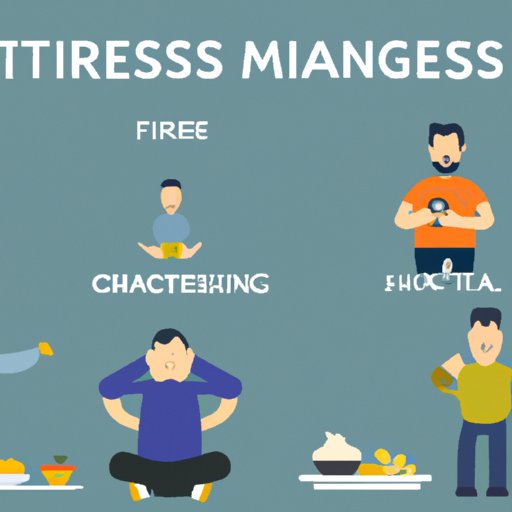Introduction
Stress eating is a common problem that can lead to unhealthy habits and weight gain. It is defined as the act of consuming food in response to emotional stress or other difficult feelings. The food consumed is usually high in calories and low in nutritional value, such as junk food and processed snacks. Stress eating can become a vicious cycle, leading to increased stress levels, further cravings, and weight gain.
The good news is that there are steps you can take to break the cycle of stress eating. With the right strategies, it’s possible to reduce your stress levels and make healthier choices when it comes to food.
Identify the Triggers of Stress Eating
The first step in stopping stress eating is to identify the triggers that cause you to reach for unhealthy foods. Common triggers include boredom, loneliness, anxiety, and depression. Understanding what causes you to turn to food for comfort can help you find more productive ways to manage your emotions.
One way to do this is to keep a food journal. Write down when and why you eat, and try to identify patterns in your behavior. This can help you understand which situations lead to stress eating and give you the insight you need to make changes.
Practice Mindfulness and Self-Awareness
Mindfulness and self-awareness can be powerful tools in stopping stress eating. Learning to recognize signs of stress, such as feeling overwhelmed or anxious, can help you take action before reaching for unhealthy foods. Taking a few moments to pause and reflect can help you recognize your feelings and make better decisions.
Mindful eating is another helpful tool. This involves being aware of your thoughts, feelings, and sensations while eating. Focus on the taste, texture, and smell of your food, and savor each bite. This can help you enjoy your food more and prevent overeating due to stress.

Find Healthy Alternatives to Stress Eating
It’s important to have healthy alternatives to turn to when you’re feeling stressed. Choose nutritious snacks, such as fruits, vegetables, nuts, and seeds, to satisfy your cravings without the added calories. You can also opt for healthier versions of comfort foods, such as whole wheat pasta or baked sweet potatoes.
“If you’re looking for an alternative to unhealthy snacks, try focusing on more nutrient-dense foods,” suggests registered dietitian nutritionist Rebecca Scritchfield. “These are foods that are higher in vitamins, minerals, and fiber. They will help keep you full longer and provide lasting energy throughout the day.”
Exercise Regularly
Regular exercise has been shown to reduce stress levels and improve overall wellbeing. Even a short walk or stretching session can help you refocus and clear your mind. Aim for 30 minutes of physical activity most days of the week to reap the benefits.
Physical activity can also help boost your mood. Research from the American Psychological Association found that people who exercised regularly felt less depressed and had higher self-esteem than those who didn’t.

Seek Professional Help if Necessary
If you find that you’re struggling to control your stress eating, it may be time to seek professional help. A qualified therapist or counselor can help you develop strategies to cope with stress and make healthier choices. They can also provide guidance and support as you work to break the cycle of stress eating.
There are also medications available to treat stress eating. These include antidepressants, anti-anxiety medications, and appetite suppressants. Talk to your doctor to determine if medication is right for you.
Conclusion
Stress eating can be a difficult habit to break, but with the right strategies, it is possible to manage your stress levels and make healthier food choices. Identifying the triggers of stress eating, practicing mindfulness and self-awareness, finding healthy alternatives, exercising regularly, and seeking professional help can all help you break the cycle of stress eating.
Making these changes can be challenging at first, but with dedication and perseverance, you can create lasting change and reclaim control over your health and wellbeing.
(Note: Is this article not meeting your expectations? Do you have knowledge or insights to share? Unlock new opportunities and expand your reach by joining our authors team. Click Registration to join us and share your expertise with our readers.)
